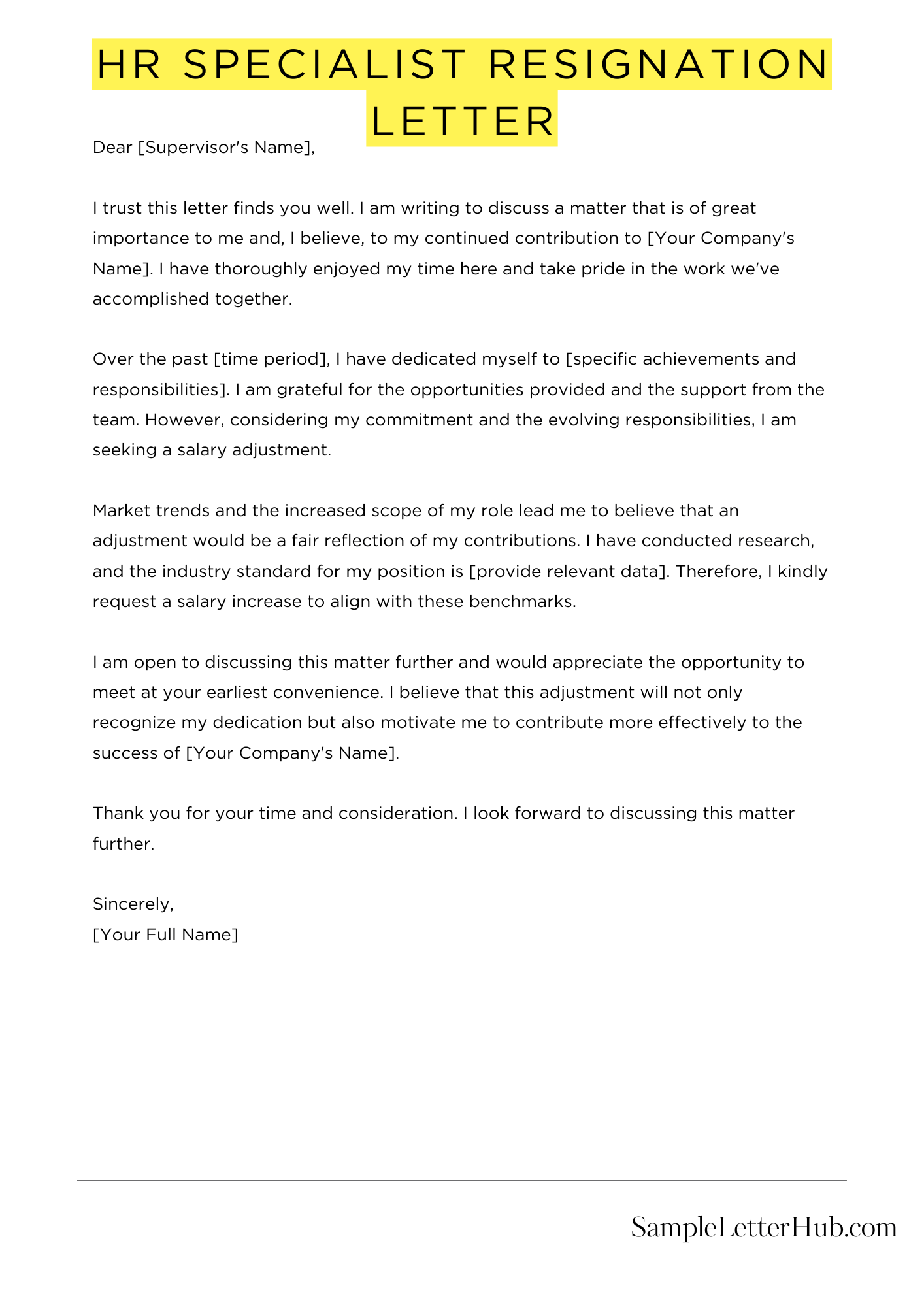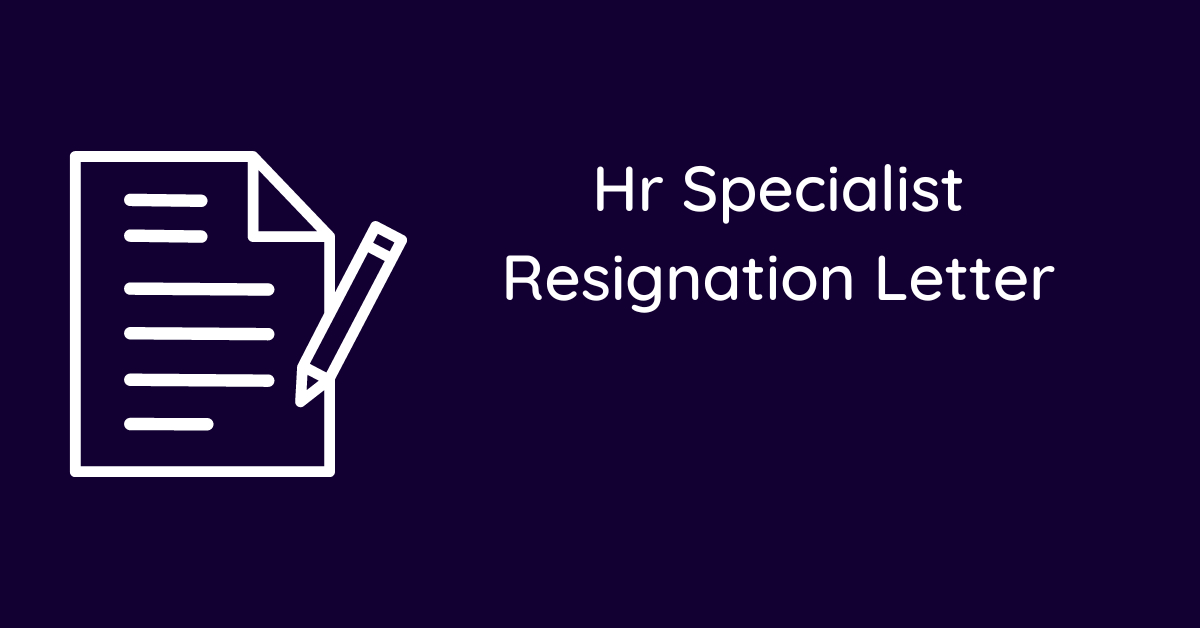In the world of HR, it’s not uncommon to seek new opportunities that align with your career aspirations. If you find yourself in this situation, crafting a clear and professional HR specialist resignation letter is crucial. In this article, we’ll share an example of an HR specialist resignation letter to help you navigate this transition smoothly.
When it comes to resigning from your position, it’s essential to maintain a polite and humble tone. Express your gratitude for the opportunities and experiences you’ve gained during your time with the company. Be clear and concise about your decision to leave, while also being respectful of your colleagues and superiors.
Below, you’ll find a template for an HR specialist resignation letter that you can tailor to your specific circumstances. Remember, the key to a successful resignation letter is to be professional, appreciative, and clear about your intentions.
Hr Specialist Resignation Letter
Dear [Recipient Name],
Please accept this letter as formal notification that I will be resigning from my position as HR Specialist at [Company Name], effective two weeks from today, [last date of employment].
During my tenure at [Company Name], I have gained invaluable experience and developed my skills in various aspects of human resources. I am grateful for the opportunities and support I have received during my time here.
I wish you and [Company Name] all the best in the future.
Sincerely,
[Your Signature]
Short Hr Specialist Resignation Letter Sample
Please accept this letter as formal notification that I am resigning from my position as Hr Specialist at [Company Name]. My last day of employment will be [Your Last Day]. Thank you for the opportunity to grow and learn during my time here. I wish you and the company continued success. I am happy to assist in the transition process to ensure a smooth handover of my responsibilities.
I wish you all the best with your hr specialist resignation letter.
When it’s time to say farewell, expressing your gratitude and best wishes can make the transition smoother:

How to Write an HR Specialist Resignation Letter
1. Start with a Formal Introduction
Begin your letter with a formal salutation, such as “Dear [Manager’s Name].” Clearly state your intention to resign from your position as an HR Specialist. Include the date of your last day of employment.
2. Express Gratitude and Appreciation
Take this opportunity to express your gratitude for the opportunities and experiences you have gained during your time with the company. Mention specific projects or initiatives that you are proud of and thank your manager for their support and guidance.
3. State Your Reasons for Leaving (Optional)
While it is not necessary to provide detailed reasons for your resignation, you may choose to briefly mention your motivations for leaving. Keep it professional and positive, focusing on your career goals or personal circumstances.
4. Offer Assistance with the Transition
Demonstrate your commitment to a smooth transition by offering to assist in any way possible. This could include training your replacement, providing documentation, or answering questions during your notice period.
5. End with a Professional Closing
Conclude your letter with a formal closing, such as “Sincerely” or “Best regards.” Include your full name and signature below.
6 Most Frequently Asked Questions About HR Specialist Resignation Letters
Resigning from a position as an HR specialist can be a daunting task. To help you navigate the complexities of writing a resignation letter, we’ve compiled a list of the six most frequently asked questions and their answers.
1. What is the proper format for an HR specialist resignation letter?
A resignation letter should be formal and concise. It should include your name, position, the date you are resigning, and your last day of employment. You should also express your gratitude for the opportunity to work at the company and wish them well in the future.
2. What should I include in the body of my resignation letter?
In the body of your resignation letter, you can briefly explain your reasons for leaving. You can also offer to help with the transition during your notice period.
3. How much notice should I give?
The amount of notice you should give depends on your contract and company policy. However, it is generally considered good practice to give at least two weeks’ notice.
4. Can I negotiate my notice period?
In some cases, you may be able to negotiate your notice period. This is especially true if you have a good relationship with your manager and the company is in a difficult position.
5. What should I do if I am asked to sign a non-compete agreement?
Non-compete agreements are common in the HR field. If you are asked to sign one, you should carefully review it with an attorney before signing.
6. What if I am not sure how to write my resignation letter?
If you are not sure how to write your resignation letter, you can seek help from a career counselor or online resources. There are also many templates available online that you can use as a starting point.
Before making the decision to resign from your job, it’s essential to consider the legal aspects:
Understanding your emotions after quitting your job is important. Explore why you might be feeling sad:
Related
- Resignation letter sample
- Forced resignation letter
- Resignation letter due to going abroad
- Resignation letter due to marriage
- Resignation letter due to other opportunity
- Resignation letter due to mistake

